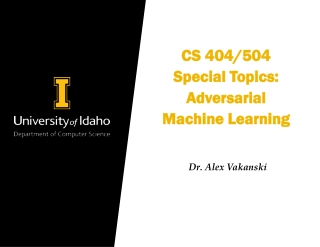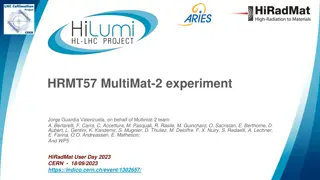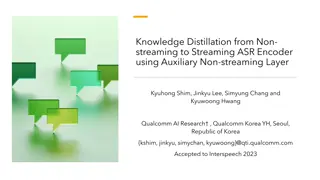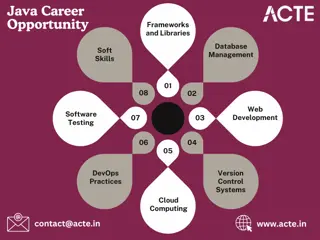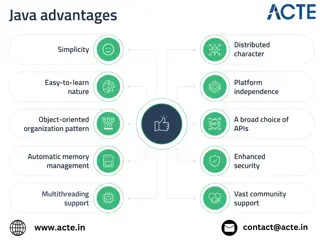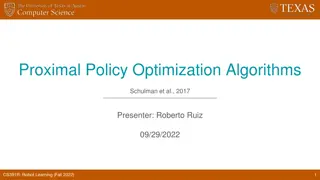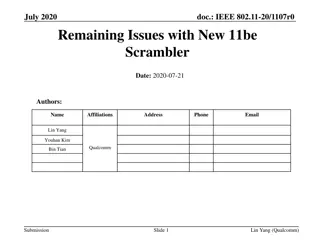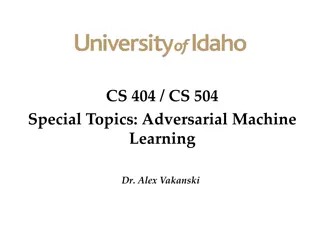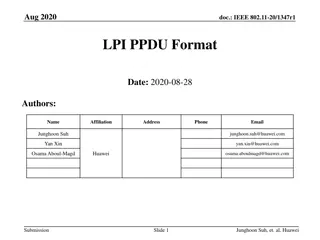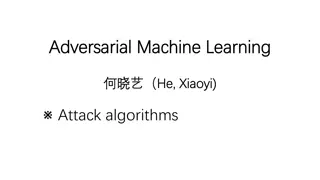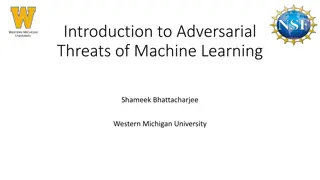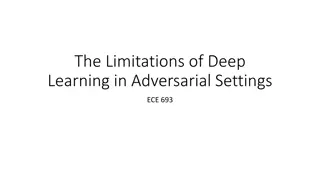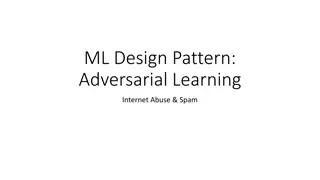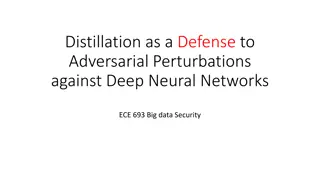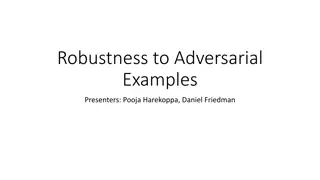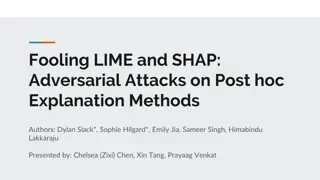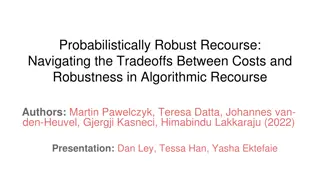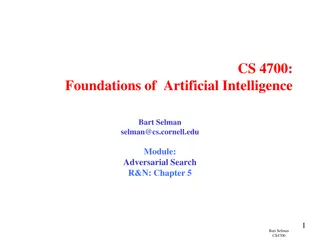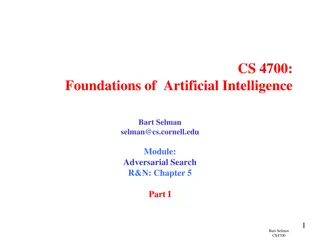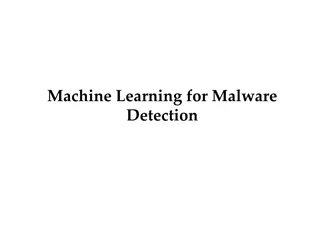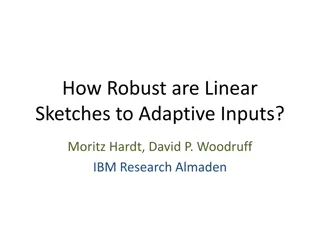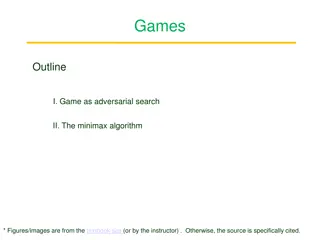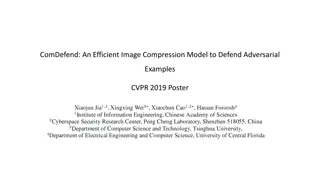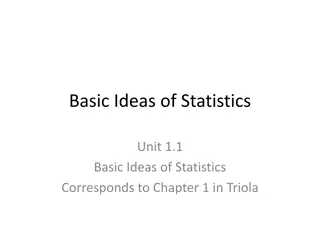Adversarial Machine Learning in Cybersecurity: Challenges and Defenses
Adversarial Machine Learning (AML) plays a crucial role in cybersecurity as security analysts combat continually evolving attack strategies by malicious adversaries. ML models are increasingly utilized to address the complexity of cyber threats, yet they are susceptible to adversarial attacks. Inves
2 views • 46 slides
CS 404/504 Special Topics
Adversarial machine learning techniques in text and audio data involve generating manipulated samples to mislead models. Text attacks often involve word replacements or additions to alter the meaning while maintaining human readability. Various strategies are used to create adversarial text examples
1 views • 57 slides
Multimat-2 Experiment: Advancements in HL-LHC Collimator Technologies
The Multimat-2 experiment conducted by Jorge Guardia Valenzuela and the team at CERN focused on testing prototypes of HL-LHC collimators, including materials and coatings, to improve the robustness and performance under extreme conditions. The goals included deriving strength models, exploring failu
0 views • 13 slides
Understanding Robust Estimation Methods for Handling Outliers in Data Analysis
This content delves into the importance of robust estimation in dealing with outliers in data analysis. It covers topics such as moving averages, the impact of outliers, reasons for outlier occurrence, and the robustness of median compared to mean calculations. Additionally, it explores moving media
1 views • 34 slides
Do Input Gradients Highlight Discriminative Features?
Instance-specific explanations of model predictions through input gradients are explored in this study. The key contributions include a novel evaluation framework, DiffROAR, to assess the impact of input gradient magnitudes on predictions. The study challenges Assumption (A) and delves into feature
0 views • 32 slides
Knowledge Distillation for Streaming ASR Encoder with Non-streaming Layer
The research introduces a novel knowledge distillation (KD) method for transitioning from non-streaming to streaming ASR encoders by incorporating auxiliary non-streaming layers and a special KD loss function. This approach enhances feature extraction, improves robustness to frame misalignment, and
0 views • 34 slides
Ensuring Reliability of Deep Neural Network Architectures
This study focuses on assuring the reliability of deep neural network architectures against numerical defects, highlighting the importance of addressing issues that lead to unreliable outputs such as NaN or inf. The research emphasizes the widespread and disastrous consequences of numerical defects
0 views • 26 slides
Top 10 Ways You Can Prevent Damage To Your Pallet Racking Systems
Pallet racking systems are the undoubted champions of warehouse efficiency, offering indispensable storage solutions that maximize available space and boost workflow efficiency. Despite their robustness and critical role in seamless operations, these systems are not indestructible.\n\n\/\/seeracking
1 views • 4 slides
Ensuring Academic Integrity in AI-Driven Assessments
The University of Bath is aligning with key principles to maintain assessment robustness and prepare students for the future workplace. Guidelines include AI literacy, ethical use, and collaboration. Clarification on GenAI use categories and academic integrity is provided, stressing the importance o
3 views • 6 slides
Wood Flooring Installation: Beautify Your Home
With professional wood floor installation from blackhawkfloors.com, you may completely change your area. Discover the elegance and robustness of our superior goods.
1 views • 1 slides
Enhancing Your Java Skills: Key Areas to Boost Your Career Opportunities
Java is a cornerstone of modern software development, known for its versatility and robustness. However, to maximize your career potential and stay competitive in today\u2019s tech industry, it\u2019s beneficial to complement your Java skills with ad
1 views • 1 slides
Understanding Java: The Backbone of Cross-Platform Development
Java stands as a cornerstone in the realm of programming languages, revered for its versatility and robustness. Enrolling in a Java Course in Pune significantly enhances one\u2019s ability to leverage Java\u2019s capabilities effectively. Understandi
1 views • 1 slides
Advanced Reinforcement Learning for Autonomous Robots
Cutting-edge research in the field of reinforcement learning for autonomous robots, focusing on Proximal Policy Optimization Algorithms, motivation for autonomous learning, scalability challenges, and policy gradient methods. The discussion delves into Markov Decision Processes, Actor-Critic Algorit
6 views • 26 slides
Remaining Issues with New 11be Scrambler in IEEE 802.11-20
IEEE 802.11-20/1107r0 discusses the introduction of a new 11-bit scrambler in 11be to reduce payload PAPR. The document addresses issues related to the scrambler seed for CTS in response to MU-RTS transmissions, including the generation of PPDU synchronous scramblers, bit modulation in CTS and MU-RT
0 views • 7 slides
Exploring Adversarial Machine Learning in Cybersecurity
Adversarial Machine Learning (AML) is a critical aspect of cybersecurity, addressing the complexity of evolving cyber threats. Security analysts and adversaries engage in a perpetual battle, with adversaries constantly innovating to evade defenses. Machine Learning models offer promise in combating
0 views • 43 slides
Enhance Your Floors with Spenza Ceramics Tiles
Transform your floors with Spenza Ceramics Tiles! Explore our diverse collection featuring sleek modern designs and durable classics. Whether you seek elegance or robustness, find the perfect tiles to elevate your space with style and quality. Discov
4 views • 7 slides
Proposed 80 MHz EHT LPI PPDU Format for IEEE 802.11-20/1347r1
The document presents the proposed LPI PPDU format for IEEE 802.11-20/1347r1, focusing on enhancing the robustness of the preamble and payload in non-OFDMA frames. The format includes repetitions of U-SIG and E-SIG symbols, optimizing DCM gain for improved performance. Simulation results show advant
0 views • 12 slides
Understanding Adversarial Attacks in Machine Learning
Adversarial attacks in machine learning aim to investigate the robustness and fault tolerance of models, introduced by Aleksander Madry in ICML 2018. This defensive topic contrasts with offensive adversarial examples, which seek to misclassify ML models. Techniques like Deep-Fool are recognized for
0 views • 29 slides
Understanding Adversarial Machine Learning Attacks
Adversarial Machine Learning (AML) involves attacks on machine learning models by manipulating input data to deceive the model into making incorrect predictions. This includes creating adversarial examples, understanding attack algorithms, distance metrics, and optimization problems like L-BFGS. Var
0 views • 88 slides
Understanding Adversarial Threats in Machine Learning
This document explores the world of adversarial threats in machine learning, covering topics such as attack nomenclature, dimensions in adversarial learning, influence dimension, causative and exploratory approaches in attacks, and more. It delves into how adversaries manipulate data or models to co
0 views • 10 slides
Limitations of Deep Learning in Adversarial Settings
Deep learning, particularly deep neural networks (DNNs), has revolutionized machine learning with its high accuracy rates. However, in adversarial settings, adversaries can manipulate DNNs by crafting adversarial samples to force misclassification. Such attacks pose risks in various applications, in
0 views • 38 slides
Adversarial Risk Analysis for Urban Security
Adversarial Risk Analysis for Urban Security is a framework aimed at managing risks from the actions of intelligent adversaries in urban security scenarios. The framework employs a Defend-Attack-Defend model where two intelligent players, a Defender and an Attacker, engage in sequential moves, with
1 views • 26 slides
Adversarial Learning in ML: Combatting Internet Abuse & Spam
Explore the realm of adversarial learning in ML through combating internet abuse and spam. Delve into the motivations of abusers, closed-loop approaches, risks of training on test data, and tactics used by spammers. Understand the challenges and strategies involved in filtering out malicious content
0 views • 13 slides
Distillation as a Defense Against Adversarial Perturbations in Deep Neural Networks
Deep Learning has shown great performance in various machine learning tasks, especially classification. However, adversarial samples can manipulate neural networks into misclassifying inputs, posing serious risks such as autonomous vehicle accidents. Distillation, a training technique, is proposed a
3 views • 31 slides
Understanding Robustness to Adversarial Examples in Machine Learning
Explore the vulnerability of machine learning models to adversarial examples, including speculative explanations and the importance of linear behavior. Learn about fast gradient sign methods, adversarial training of deep networks, and overcoming vulnerabilities. Discover how linear perturbations imp
0 views • 37 slides
Adversarial Attacks on Post-hoc Explanation Methods in Machine Learning
The study explores adversarial attacks on post-hoc explanation methods like LIME and SHAP in machine learning, highlighting the challenges in interpreting and trusting complex ML models. It introduces a framework to mask discriminatory biases in black box classifiers, demonstrating the limitations o
2 views • 18 slides
Understanding Game Playing and Adversarial Search at University of Berkeley
Delve into the realm of game playing and adversarial search at the University of Berkeley to understand the complexities of multi-agent environments. Explore the concepts of competitive MA environments, different kinds of games, and the strategic decision-making processes involved in two-player game
0 views • 81 slides
Exploring Robustness and Developmental Systems: A Workshop Overview
Delve into the intricate world of developmental systems and robustness with insights from Paul E. Griffiths. Discover the evolution of developmental processes, the significance of epigenetics, and the interplay between genotypes and phenotypes. Gain a deeper understanding of epigenetic inheritance a
0 views • 17 slides
Robustness Requirements for Electricity Generation Facilities
The document outlines robustness requirements for electricity generation facilities, covering fault-ride-through properties, clear time and voltage parameters for different types of generation facilities connected to both the distribution grid and transmission grid. Specific requirements for synchro
0 views • 8 slides
Understanding Zero-Shot Adversarial Robustness for Large-Scale Models
Pretrained large-scale vision-language models like CLIP show strong generalization on unseen tasks but are vulnerable to imperceptible adversarial perturbations. This work delves into adapting these models for zero-shot transferability in adversarial robustness, even without specific training on unk
0 views • 18 slides
Navigating Tradeoffs in Algorithmic Recourse: A Probabilistic Approach
This paper introduces PROBE, a Probabilistically Robust Recourse framework allowing users to balance cost and robustness in algorithmic recourse. Users can choose the recourse invalidation rate, enabling more tailored and efficient recourse management compared to existing methods. PROBE enhances cos
0 views • 17 slides
Evaluating Adaptive Attacks on Adversarial Example Defenses
This content discusses the challenges in properly evaluating defenses against adversarial examples, highlighting the importance of adaptive evaluation methods. While consensus on strong evaluation standards is noted, many defenses are still found to be vulnerable. The work presents 13 case studies o
0 views • 9 slides
Understanding Adversarial Search in Artificial Intelligence
Adversarial search in AI involves making optimal decisions in games through concepts like minimax and pruning. It explores the strategic challenges of game-playing, from deterministic turn-taking to the complexities of multi-agent environments. The history of computer chess and the emergence of huma
0 views • 56 slides
Foundations of Artificial Intelligence: Adversarial Search and Game-Playing
Adversarial reasoning in games, particularly in the context of artificial intelligence, involves making optimal decisions in competitive environments. This module covers concepts such as minimax pruning, game theory, and the history of computer chess. It also explores the challenges in developing AI
0 views • 56 slides
Machine Learning for Cybersecurity Challenges: Addressing Adversarial Attacks and Interpretable Models
In the realm of cybersecurity, the perpetual battle between security analysts and adversaries intensifies with the increasing complexity of cyber attacks. Machine learning (ML) is increasingly utilized to combat these challenges, but vulnerable to adversarial attacks. Investigating defenses against
0 views • 41 slides
Robustness of Linear Sketches to Adaptive Inputs in Big Data Processing
Exploring the robustness of linear sketches in handling adaptive inputs in big data scenarios. The study covers applications like compressed sensing, data streams, and distributed computation. It delves into the challenges posed by adaptive inputs and the implications for correctness and efficiency
0 views • 27 slides
Evaluation of Onboard Intelligence Systems DeepASL and SparseSep
In this evaluation, we assess the performance of two onboard intelligence systems - DeepASL and SparseSep. DeepASL is evaluated for performance, time efficiency, memory usage, energy consumption, and user experience, with a focus on accuracy and robustness. SparseSep is analyzed for its performance
0 views • 16 slides
Exploring Adversarial Search and Minimax Algorithm in Games
Competitive games create conflict between agents, leading to adversarial search problems. The Minimax algorithm, used to optimize player decisions, plays a key role in analyzing strategies. Studying games offers insights into multiagent environments, economic models, and intellectual engagement. The
0 views • 17 slides
Efficient Image Compression Model to Defend Adversarial Examples
ComDefend presents an innovative approach in the field of computer vision with its efficient image compression model aimed at defending against adversarial examples. By employing an end-to-end image compression model, ComDefend extracts and downscales features to enhance the robustness of neural net
0 views • 16 slides
Understanding Measurement and Robustness in Statistics
Measurement is essential in statistics to quantify attributes and draw conclusions. Robust conclusions withstand testing and can be treated as facts. Robustness is crucial in scientific inquiry to challenge existing beliefs and discover new insights. An example of robust findings is the longstanding
0 views • 15 slides
